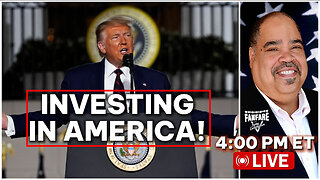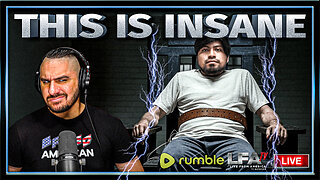Premium Only Content

business
The end of World War II did not bring peace at home. Nuclear anxiety, anti-Communism and international political realignments fueled the Cold War and turned our country's media landscape into a battleground from the late 1940s on. In the press, on the radio, and increasingly through the newly emerging medium of television, business and labor struggled for power over the national consciousness. Seeking a prize worth much more than public consent, these opposing forces fought to redefine the economic structure of the nation.
To most working people, postwar "normalcy" meant a final farewell to Depression-induced privation, access to consumer goods unavailable during the war years, and a redistribution of the economic pie through the newly powerful labor movement. To business, however, the end of hostilities promised freedom from New Deal liberalism. Corporations sought an end to planning and government influence, to communist, socialist and labor movements, and above all, shrinkage of the public sector, swollen in sixteen years of economic depression and war. Both sides characterized their points of view as patriotic and their opponents as un-American.
Business fought for influence through organizations like the U.S. Chamber of Commerce and the National Association of Manufacturers. Their intentions were presented as lofty and neutral: to educate Americans about our economic system and its benefits. Launching a giant propaganda offensive, these organizations pumped out press releases, published books, organized public and private meetings, bought advertising and produced motion pictures.
It's Everybody's Business links the Bill of Rights to the tenets of free-enterprise ideology, "interlocking inseparably the blocks of our political and economic freedom." This strategy expresses not only the opinions of the film's sponsors, but is also a skillful attempt to co-opt liberal discourse, which sought to champion the Bill of Rights against McCarthyite excesses. By linking freedom and patriotism with the market economy the movie tries to manufacture universal consensus.
Like other Sutherland productions (Make Mine Freedom, Meet King Joe and A Is For Atom), this employs a "stealth" strategy. Self-deprecating humor prevails, perhaps because the films were made to play before distracted and highly skeptical audiences, and the targets of this humor include our consumer culture and the dubious innovations it creates.
Aside from self-deprecating humor, this film features several memorable visual devices: the "tax monster," the tidal wave of war, and the animated paper money riding on the train.
Alicante by Scandinavianz https://soundcloud.com/scandinavianz
Creative Commons — Attribution 3.0 Unported — CC BY 3.0
Free Download / Stream: http://bit.ly/3TKlrnw
Music promoted by Audio Library https://youtu.be/DABaj_ZXNts
It's Everybody's Business
-

vivafrei
4 hours agoTrump's First 100 Days RECAP! Alberta Referendum on the Horizon? AND MORE!
17.7K12 -
 LIVE
LIVE
Barry Cunningham
1 hour agoWATCH LIVE: PRESIDENT TRUMP SPEECH ON INVESTING IN AMERICA!
2,111 watching -
 LIVE
LIVE
Dr Disrespect
6 hours ago🔴LIVE - DR DISRESPECT - WARZONE NUKE - WILL IT EXPLODE?
2,958 watching -
 LIVE
LIVE
LFA TV
19 hours agoALL DAY LIVE STREAM - WEDNESDAY 4/30/25
2,223 watching -
 13:35
13:35
IsaacButterfield
12 hours ago $0.19 earnedEXPOSING FAKE “Down Syndrome” OnlyFans Models...
9219 -
 1:58:53
1:58:53
Darkhorse Podcast
4 hours agoThe 274th Evolutionary Lens with Bret Weinstein and Heather Heying
21.4K19 -
 30:09
30:09
Iggy Azalea
1 hour ago $0.45 earnedplaying motherland
2.54K3 -
 LIVE
LIVE
StoneMountain64
4 hours ago1st stream BACK! Arc Raiders BRAND new exclusive alpha early look
253 watching -
 2:12:09
2:12:09
The Quartering
4 hours agoUkraine Mineral Deal Today, China Suffering From Tariffs, Epstein Suicide Letter, Meme Ban!
113K38 -
 1:17:36
1:17:36
The White House
4 hours agoPress Secretary Karoline Leavitt Briefs Members of the New Media, Apr. 30, 2025
49.2K27